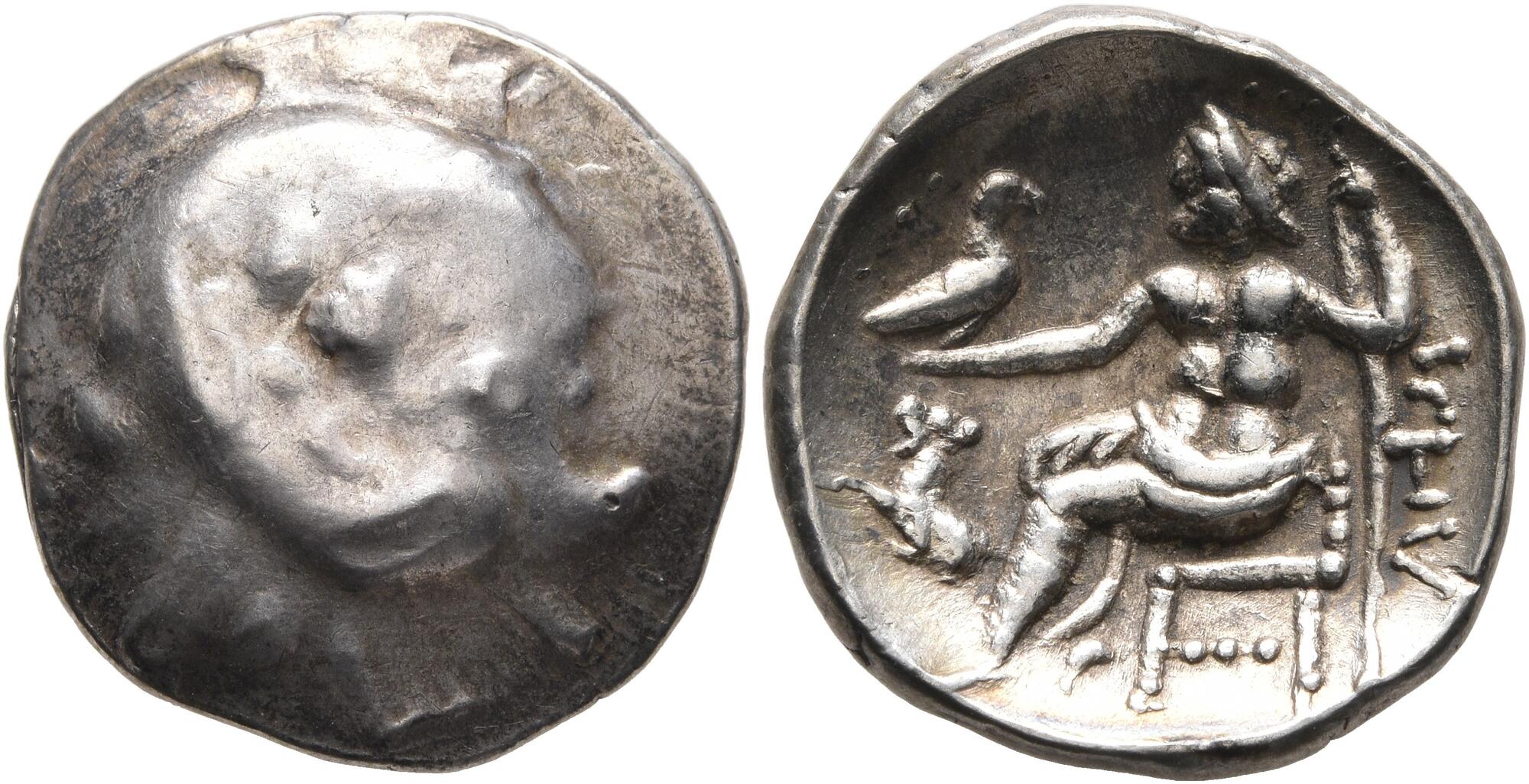S 1573 - Ancyra (?) (Galatians), silver, drachms (250-200 BCE)
From SILVER
250 BCE - 200 BCE Silver 1,739 kg
Description
| ObverseInscription or printing placed on the obverse.: | Celticized head of Herakles to right, wearing lion skin headdress |
| ReverseInscription or printing placed on the reverse.: | Celticized Zeus seated left on low throne, holding long scepter in his left hand and eagle standing right with closed wings in his right, to left, forepart of a lion, to right, imitative legend |
Mint and issuing power
| MintIdentifies the place of manufacture or issue of a numismatic object.: | Ancyra | Ancient regionAncient region.: | Galatia | Modern countryModern country: Turkey | AuthorityIdentifies the issuing power. The authority can be "pretended" when the name or the portrait of X is on the coin but he/she was not the issuing power. It can also be "uncertain" when there is no mention of X on the coin but he/she was the issuing power according to the historical sources: | Alexander III the Great (Argead king, 336-323 BC) |
Chronology
| FromIdentifies the initial date in a range assigned in a numismatic context. | 250 BCE | toIdentifies the final date in a range assigned in a numismatic context.. | 200 BCE | PeriodTime period of the numismatic object.: Hellenistic 323-30 BC |
Physical description
| MetalThe physical material (usually metal) from which an object is made.: | Silver |
Median weightMedian of the weights of numismatic objects (in grams). in grams | 3.60 | DenominationTerm indicating the value of a numismatic object. Examples: tetradrachm, chalkous, denarius.: | drachma |
StandardStandard.: | Attic |
Image

S1573 Alexander Galatians.jpg [1]
References
| Die study referencePublication of the study: | Fischer-Bossert 20211Fischer-Bossert 2021 | ||
| Coin series referenceReference to coin series study: | |||
Obverse dies distribution
| FrequencyFrequency of specimen in distribution. ᵖ | Number of obversesNumber of obverse dies. ᵖ (o) | % (o) | Number of coinsNumber of coins. (n) | % (n) | Die nameName(s) of the die(s). |
| 1 | 8 | 40 | 8 | 11.43 | 5, 6, 7, 8, 9, 15, 17, 19 |
| 2 | 4 | 20 | 8 | 11.43 | 3, 12, 13, 18 |
| 3 | 3 | 15 | 9 | 12.86 | 1, 2, 11 |
| 4 | 2 | 10 | 8 | 11.43 | 10, 14 |
| 6 | 1 | 5 | 6 | 8.57 | 20 |
| 8 | 1 | 5 | 8 | 11.43 | 16 |
| 23 | 1 | 5 | 23 | 32.86 | 4 |
| Total | 20 of 20 | 100 | 70 of 70 | 100.01 |
Reverse dies distribution
no distribution is available
Quantification
| Number of obversesNumber of obverse dies. ᵖ (o) | 20 | Number of singletons (o1)The number of singleton coins. ᵖ | 8 |
| Number of reverse diesNumber of reverse dies. (r) | 55 | Number of coinsNumber of coins. (n) | 70 |
| Coins per obverse dieNumber of coins per obverse die. (n/o) | 3.5 | Coins per reverse dieNumber of coins per reverse die. (n/r) | 1.27 |
| Reverse per obverse ratioRatio of obverse dies divided by reverse dies. (r/o) | 2.75 | Percentage of singletons (o1)number of coins (n) divided by the number of singletons (o1) ᵖ | 40 % |
| Original number of dies (O) (Carter 1983 formula)The estimation of the number of coins according to Carter 1983 ᵖ | 24.15 | Coins struck if 20,000 as average productivity per dieCoins made if the average productivity for obverses (according to Carter) is 20,000. ᵖ | 483,000 |
| Original number of dies (O) (Esty 2011 formula)The estimation of the number of coins according to the singleton formula in Esty 2011 ᵖ (O) | 28 | Survival rate if 20,000 as average productivity per dieSurvival rate if average productivity is 20,000. ᵖ | 0.00014 |
| Coverage (o = % of O) (Esty 1984 formula)Esty 1984 - coverage (% of O) ᵖ (o = % of O) | 88.57% | Die productivity if survival rate 1/2,000Average productivity if survival rate is 1/2,000. ᵖ | 5,797.1 |
| Weight of silver (in kg) if 20,000 coins per die (O = Carter formula)Carter 1983 * Median weight * 20000 (*10 if gold or electrum) ᵖ | 1,739 kg <br /> 1,739 kg | Die productivity if survival rate 1/5,000Average productivity if survival rate is 1/5,000. ᵖ | 14,492.75 |
Remarks
References
- ^ Fischer-Bossert, Wolfgang (2021), "Celtic Drachms from Asia Minor", in R. Ciołek and R. Chowaniec (eds), Aleksanderia. Studies on Items, Ideas and History Dedicated to Professor Aleksander Bursche on the Occasion of his 65th Birthday, Wiesbaden, p. 117–130.